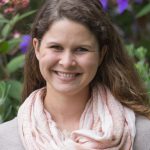
Preview the 2018 Capstone Symposium
The University of San Francisco Master of Arts in Urban Affairs and Master of Public Affairs invites you to join us for the 2018 graduating classes’ capstone presentations on May 14th and May 15th. The capstone project is the final requirement for the completion of their master’s degree and includes a well-researched analytical paper that applies the knowledge, skills, and methods of the program, in addition to an oral presentation. We are incredibly proud of our graduate students and believe their research will inspire positive changes for the common good.

Rebecca Charlton, PublicAffairs ’18
That’s Not Our Job: Individualism and State Responsibility After Welfare Reform
In 1996 President Bill Clinton overhauled our nation’s welfare system with drastic spending cuts and new work requirements. This capstone will explore the legislation’s cultural framework, punitive impact on low-income women, and offer a policy re-write to lift single mothers out of poverty.

Maya Chupkov, Public Affairs ’18
Care and Cash: Addressing San Francisco’s Homelessness Crisis With A Basic Income
Maya is exploring the intersection between basic income and preventing homelessness in San Francisco. She situates her research with a case study of Care Not Cash, a measure passed in 2002 that altered the homeless delivery system. She performs an in-depth analysis of San Francisco’s current homelessness problem, including the preventive strategies that could be strengthened with cash assistance models.

Amy Dundon, Urban Affairs ’18
Finding “Free City”
Finding “Free City” retraces the story of the City College of San Francisco, a public two-year community college, through its recent troubles and eventual resilience. In the span of five years, the college went from nearly closing its doors to offering classes free of charge to San Francisco residents. The research offers a critical analysis of the recent historical educational and economic policies that have shaped City College. Through the frame of class struggle, Finding “Free City” grants insight into community building and labor union organizing, questions normative economic systems, and evokes a new interpretation of the right to the city.
 Leslie Gordon, Urban Affairs ’18
Leslie Gordon, Urban Affairs ’18
Building a Better Map: Imagining Racial Equity in Oakland
Leslie’s research investigates visions of racial equity among institutional and grassroots actors who have a role in shaping Oakland’s urban space. As the city of Oakland works to codify and institutionalize racial equity through several initiatives, including the formation of the Department of Race and Equity and a new downtown planning process, how do we imagine a racially equitable Oakland? How would such a city look, feel, and function?

Nicholas Large, Public Affairs ’18
Fierce Landmarking: Representation and the Queering of Political Power
This capstone examines place-based organizing for the LGBT community in San Francisco. Comparing contemporary memorializations like the Compton’s Transgender Cultural District and the Harvey Milk SFO Terminal to the Stonewall Inn, it offers a look into the movement behind the places. Operating under a context of gentrification, this capstone asks if it is the story or the place that matters, and what the implications of each are for a rapidly changing community fighting for equity.

Briana Gonzalez, Public Affairs ’18
The Invisible Population: Providing Family Services for Single Student-Mothers at USF
Briana’s capstone is on the growing population of single student mothers in academia. She conducts a comparative analysis of several higher education institutions, highlighting the family services they provide. Briana focuses on the University of San Francisco to raise awareness of the lack of family resources on its campus. In her capstone, she demonstrates why USF can no longer ignore this group of students and how the university can implement family resources of its own to assist single mothers in achieving academic success.
Bridget Mahoney, Public Affairs ’18 
Taking the Initiative: Are Ballot Measures Failing SF’s Homeless Crisis?
Through an analysis of the 2016 San Francisco Proposition Q campaign, this paper will analyze if the ballot measure/ initiative process is the best way to tackle homelessness. In doing so, I will explore why members of the Board of Supervisors continue to use the ballot instead of other legislative processes to correct this major issue.

Bernice Rosas Belmonte. Public Affairs ’18
Room at the Table: Inviting Latino Familial Support into the Discussion of College Access
Bernice’s research examines modes of encouraging and supporting Latinx first-generation college student families, specifically in Stockton area high schools. Her findings highlight the necessity of bringing Latino families into the conversation of college access in order to further first-generation college students’ higher education goals.

Justin Balenzuela, Urban Affairs ’18
Rounding Up Outlaw In-Laws
San Francisco is experiencing an economic boom that’s driving population growth and housing costs. As pressure builds, the accessibility of affordable housing options is constrained, and options are reduced to illegal or substandard housing conditions. Justin’ research focused on in-law units, which can be illegal and include substandard housing conditions, and addressing the conundrum of bringing units up to code without affecting tenants. His goal is to improve unit safety by encouraging the legalization of illegal in-laws, all while preventing the displacement of existing tenants while units undergo renovations.

Denise Garcia, Urban Affairs ’18
Just Transit: Governing Sustainability in Los Angeles
As more cities experience the detrimental impacts of climate change, the need for sustainable planning implementation increases. Throughout various cities, regions, and the state, sustainability plans have been developed and implemented, but questions remain as to whether their approach or implementation will have the desired mitigating impacts. Drawing from an equitable framework, this paper includes a comparison analysis to critique current sustainability plans developed from 3 different levels of governance.

Aaron Gordon, Public Affairs ’18
Do Tech Workers Care About San Francisco? Analyzing Political Engagement
Over the past decade, there have been tensions between the tech Industry and long-term residents of San Francisco. Many people are concerned with the influence that large tech companies have on local politics. But what effect is the average tech worker having on San Francisco politics? This study aims to answer that question.

Erika Sandberg, Public Affairs ’18
The Secret Door: Transparency and Privacy in the California Juvenile Justice System
Erika’s research addresses the imbalance between transparency and privacy in the California juvenile justice system, and the effects this heightening of opacity have on judicial and governmental accountability. The rationales for increased privacy are rehabilitation and avoidance of youth stigmatization, yet decades of legislative enactments suggest a shift towards more punitive measures. This research will propose recommendations to optimize the balance between the two competing concepts while keeping the privacy of youths intact, because without insight, who are we really protecting? The children or the institution?

Jessica Lindquist, Public Affairs ’18
Protecting San Francisco Residents From The Wolves of Wall Street: A Case Study
In response to the 2008 financial crisis, the Obama administration created the Consumer Financial Protection Bureau (CFPB), the federal agency responsible for protecting consumers from abusive, deceptive and predatory practices of the financial services industry. The CFPB’s consumer complaint database has been an important resource for the American public for the past seven years. However, the Trump administration has declared its intentions to remove the database from public view, an action lobbied for by the financial services industry. Jessica conducts the first deep data analysis of the public complaints filed to the CFPB Consumer Complaint database by San Francisco residents. Her case study highlights how consumer financial harms are a citywide problem: San Franciscans living at every income level and in every part of the city are struggling to resolve their financial issues with the wolves of Wall Street, the financial services industry.

Ceaundra Thomas, Urban Affairs ’18
Reframing Deficit Theories about Black Boys in Oakland Schools
Deficit oriented theories have been used in the United States education system as a means of justifying the disparities we see amongst gender and racial groups, specifically Black boys. Ceaundra’s capstone focuses on how these deficit theories can be reframed to more accurately capture the root of these disparities. Over time, systematic barriers have presented a multitude of obstacles that hinder people of color from receiving the same quality of education as their white peers. By focusing on the African American Male Achievement program implemented by Oakland Unified School District, she antagonizes the master narrative of Black boys underperforming because of their culture, and conceptualize ways that the education system can better serve Black boys.

